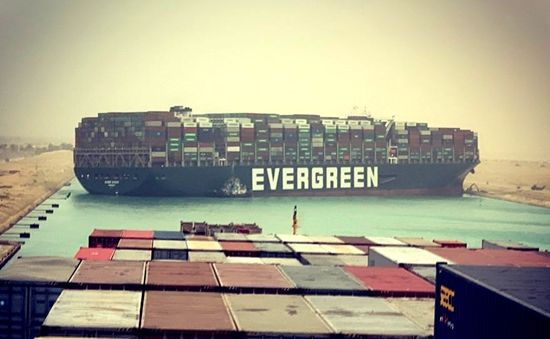The impact of the 2021 Suez Canal obstruction on shipping|Aquasky

On March 23, 2021, at 7:40, Egypt time, Ever Given, the 400-meter-long (1,300 ft) vessel, the size of which is equivalent to 4 football fields, ran aground on the Suez Canal on the way from China to Rotterdam and crossed the middle of the waterway. This is one of the most serious incidents in the history of the Suez Canal. Some media also called it the "Suez Crisis". Until March 29th, thanks to the efforts of engineers and many professionals, the Ever Given was finally able to get out of trouble.
This incident caused a total of 370 petroleum tankers, cargo ships, and other vessels to dock at both ends of the canal. The direct and indirect economic losses caused by the voyage delay this time were estimated to be hundreds of millions of dollars per hour. Although the Suez Canal Authority (SCA) reopened an old channel to clear some ships after the incident, this channel can only allow ships with shallow drafts and smaller hulls to pass. Even so, the canal authority estimates that canal operating income was influenced due to channel blockage. A reduction of approximately 14 million to 15 million US dollars.
The Suez Canal is an artificial sea-level waterway in Egypt, connecting the Mediterranean Sea to the Red Sea through the Isthmus of Suez and dividing Africa and Asia. The canal is part of the Silk Road that connects Europe with Asia. Since its official sailing in 1869, European great powers had regarded this canal as an important channel to India and Asia. It is also one of the few lockless canals in the world that can pass large merchant ships. The merchant ships that pass daily carry about 1 million barrels of crude oil and 8% of liquid natural gas. It includes commodities that account for more than 12% of global trade. The main scope includes clothing, furniture, industrial production parts, and auto parts. The Wall Street Journal estimates that the amount of stranded goods amounts to 12 billion U.S. dollars. Some shipping companies immediately changed their routes and chose to go around the Cape of Good Hope in Africa. This means that the voyage will increase by 8 to 12 days and the freight will also increase.
The paralysis of the waterway caused a negative impact on international oil prices and the economy due to the 10 million barrels of crude oil stranded in the canal. The impact on global trade will continue. According to a report by Reuters, Caroline Becquart, senior vice president of Mediterranean Shipping Company (MSC), pointed out that even if the canal is reopened to allow a large number of waiting for ships to pass, it will also lead to port congested and ship tailback. Delays in unloading mean that the loading of the next shipment will also be delayed. Experts also said that the chaos in the second quarter of 2021 might be worse than in the first quarter. The current canal congestion has also caused a considerable impact on the economy of Egypt. As the epidemic had severely damaged the local tourism industry, the operating expenses of the Suez Canal have become one of the important revenues for the country. According to data from the credit rating agency Moody's, before the outbreak of the novel coronavirus, 2% of Egypt's gross national product (GDP) came from the Suez Canal, which was about 5.8 billion U.S. dollars. After finding out the reasons, the Egyptian authorities sought compensation from the owner of the Ever Given. The whole case has now entered the litigation stage.
On April 6th, after the Ever Given incident was cleared, according to a report by Reuters, global oil tanker tracking websites MarineTraffic and TankerTrackers stated that an Italian oil tanker RUMFORD and a Greek oil tanker MINERVA NIKE had engine failures and other problems, which led to the suspension of the Suez Canal again unexpectedly. Fortunately, it only took more than ten minutes for each to resume traffic.
In view of the economic losses caused by the Ever Given crisis, Egyptian President Abdel Fattah al-Sisi approved the widening and deepening of the southern Suez Canal on May 11. The details of the plan were broadcast and announced by Osama Rabe, director of the Suez Canal Authority, at a ceremony held in the canal city of Ismailia. This widening of the canal will widen the southernmost channel by 40 meters (130 feet) eastward, and plans to deepen the channel from 66 feet to 72 feet. In addition, the two-way parallel channel that was expanded in 2015 will also be extended to 82 kilometers to allow more ships to pass through the canal.
This article is just for share. Please advise removing immediately if any infringement is caused.